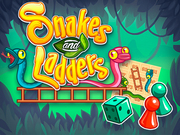
Snakes and Ladders Game - Play Free Fun Snakes Web Games
Snakes and Ladders is a 2 player ancient Indian roll and move game. 100 squares full of traps and tricks. Ladders will take you up but Snakes will take you down. This is the clasic Snakes And Ladders game. The rules of this online dice game are very simple. When it is your turn click on the dice to roll it. According to the number on the dice your pon will move the same number of homes on the board. If you land at the mouth of a snake, you will fall to the home where the snake's tail ends. Have fun!
11,196 play times
How to Play Snakes and Ladders Game
Use your mouse or touch the screen to roll the dice. When it's your turn, click on the dice to roll it. According to the number on the dice, your avatar will automatically move on the board come to rest on a square. If you land at the mouth of a snake, you will be dropped to the square on which the snake's tail ends. If you happen to land at the base of a ladder, you will automatically climb to the square on which the ladder ends.
Why is Snakes and Ladders so Popular
Chances are you've already played Snakes and Ladders. The game is a potent teaching tool whose simple design has been used for centuries, arguably even millennia, as a way to embody and reinforce religious teachings and cultural values. Surviving game boards suggest Snakes and Ladders emerged somewhere in Northern India or Nepal. Over centuries the game traveled and evolved, its basic design serving as a durable chassis for any culture that took it up, containing and transmitting their moral and spiritual beliefs.
Snakes and Ladders is an ancient board game
Snakes and Ladders is an ancient board game believed to date back to India in the 2nd century B.C.. It is played between two or more players on a gameboard having numbered, gridded squares. A number of ladders and snakes are pictured on the board, each connecting two specific board squares. The object of the game is to navigate one's game piece, according to die rolls, from the start (bottom square) to the finish (top square), helped or hindered by ladders and snakes respectively. The game is a simple race contest based on sheer luck, and is popular with young children. The game was popular in ancient India by the name Moksha Patam. It was also associated with traditional Hindu philosophy contrasting karma and kama, or destiny and desire. It emphasized destiny, as opposed to other games of that time which focused on a mixture of skill and luck. The most widely known edition of Snakes and Ladders in the United States is Chutes and Ladders released by Milton Bradley in 1943. The playground setting replaced the snakes, which were received negatively by children at the time.